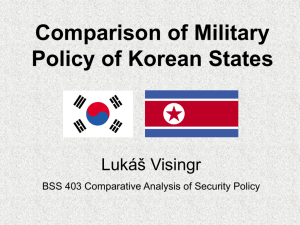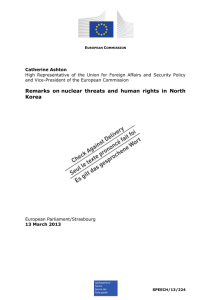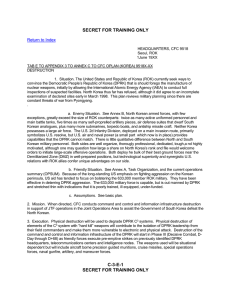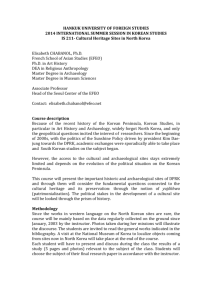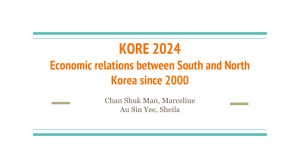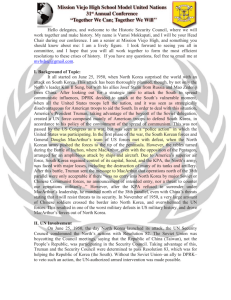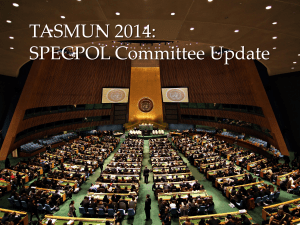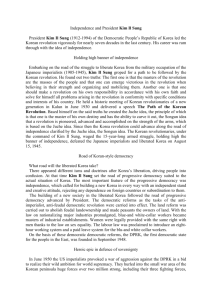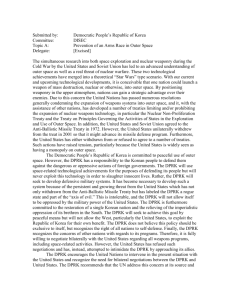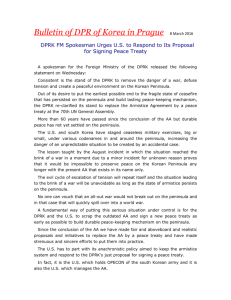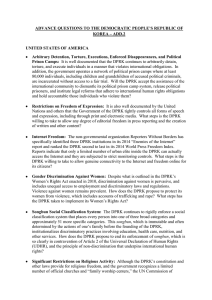Recent political relations between Japan and the Two Koreas
advertisement
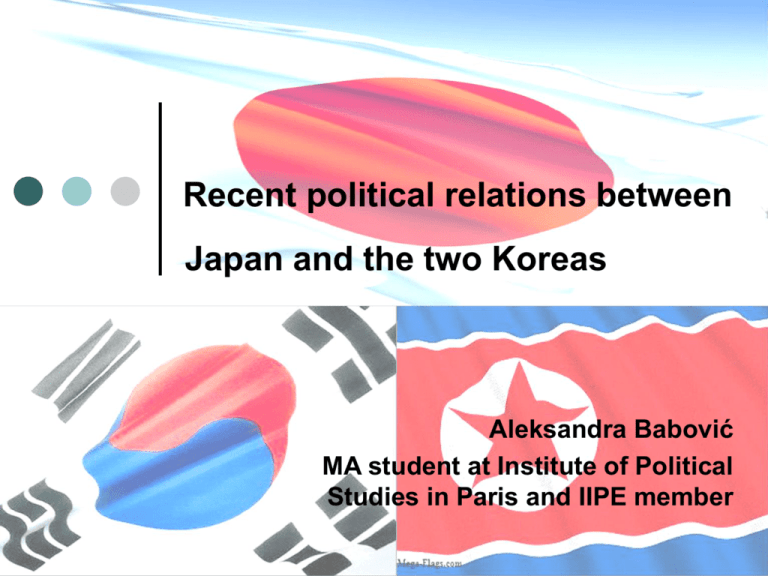
Recent political relations between Japan and the two Koreas Aleksandra Babović MA student at Institute of Political Studies in Paris and IIPE member Introduction Normalization: Japan South Korea (ROK) - Treaty on Basic Relations in 1965 motivated by economic aid (500$) Japan North Korea (DPRK) trade relations initiated in 1961 while unofficial political relations established in 70s Nixon-Sato Communiqué in 1969 - “Korean clause” : “the security of the Republic of Korea is essential to Japan’s own security” 80s – favorable to the normalization talks between Japan – DPRK, but from 90s till today they never resumed. Common point – unsolved historical issues from Japanese occupation of Korean Peninsula (1910-1945) mutual resentment Thesis: The current state of Japan and two Koreas recent political relations (from the end of the Cold war): “dualistic” with ROK and worsening with DPRK. The near future: no likely to ameliorate - peoples’ mentalities and lack of pragmatic diplomacy Prospective: Japan’s normalization process with DPRK and deepening of political ties with ROK still remain a long run goas for its diplomacy. Japan – DPRK relations: Sad State of Play and Sad Prospects A. - - - Normalization process: unreachable goal of two diplomacies September 1990 - Three-Party Declaration – encouraged apology and compensation from Japan Shift in Japanese policy toward DPRK (ROK and US pressure) – inspection of nuclear facilities by IAEA as pre-condition – normalization talks postponed until the new Millennium 1994 North Korean nuclear crisis and launching of a Taepodong missile in 1998 – friction between US-ROK-Japan - September 2001 Pyongyang Declaration – violation Adoption of a hard-line policy toward DPRK - abduction issue as a top priority on government’s agenda B. Resolving the thorny “abduction issue” - - Abductees = 13 Japanese nationals, mostly young people, who were abducted to North Korea (1977 to 1982) in order to participate in training of espionage agents Kim Jong Il’s 2002 confirmation Diplomatic efforts – 5 abductees returned in Japan BUT unconfident information on others + pressure groups reason why Japan did not redraw from this question C. Japan’s role in DPRK denuclearization within the Six-Party Talks - - - Six-Party Talks- the international forum aiming at denuclearization of DPRK initiated in 2003 The "stop and go” negotiations - erratic posture of DPRK and divergent approaches of parties involved Six-Party Talks - a second place for Japan for making potential breakthroughs on the sensitive abduction issue by pairing it up with denuclearization process D. North Korea as a security threat to Japan Nuclear tests from 1998 - a “wake-up call” for Japan The US- Japan regional missile defense system Frequent smuggling of North Korean spy ships – introduction of unilateral sanction in 2006 by Japan against DPRK (ships, goods, persons, and surveillance of money transactions) Explanation of the hard-line approach D. North Korea as a security threat to Japan Nuclear tests from 1998 - a “wake-up call” for Japan The US- Japan regional missile defense system Frequent smuggling of North Korean spy ships – introduction of unilateral sanction in 2006 by Japan against DPRK (ships, goods, persons, and surveillance of money transactions) Explanation of the hard-line approach E. April 2009 ballistic launch: new developments and their impact on the future 2009 Ballistic Launch or “communication satellite launch”, DPRK expelled IAEA inspectors, threats to resume its nuclear program September 2009 announcement : “ we entered the final phase of weaponizing plutonium and we are prepared for both, dialogue and sanctions” A real military threat or a tactical move? Possible shift on the agenda – abduction issue is to be topped by denuclearization issue Newly elected Yukio Hatoyama – continuation of a hard-line policy 2. Japan- South Korea relations A. The future-oriented and pragmatic political relations between Japan and ROK remain a goal difficult to achieve in the near future Future oriented statements strained by periodical flare-up of historical issues 1998 Joint Statement of a New ROK-Japan Partnership toward the Twenty-First Century and Roh Moo Hyun – Premier Koizumi meeting The historical international politics or historical disputes involve the battle for the power or to be more precise, it becomes “an arena when power dominates”. Different perception of political and strategic environment of three key regional players impediment for building more strategic alliance between Japan and ROK B. Periodical flare-ups of historical and territorial issues as a major impediment for full reconciliation of Japan-ROK ties The comfort women – 1992 official documents revealed the involvement of Japanese Imperial Army 1993 Kono Statement (Government admitted its moral responsibility for comfort women, apologized for their mental and physical sufferings, promised it would never repeat the same mistake and teach about it to future generations ) BUT never admitted legal responsibility Abe Shinzo’s 2007 denial of comfort women, controversy with textbooks – negative impact on Korean public opinion The problem of Asian/Women’s Fund created in 1995 The international dimension – Canada, GB, the US, the UN and the EU Parliament passed resolutions making pressure over Japan B. Periodical flare-ups of historical and territorial issues as a major impediment for full reconciliation of Japan-ROK ties The issue of Takeshima or Dokdo – in 1905 put under Japanese authority 1952 – Singhman Ree Line and two years later, Korean military presence on the islands The territorial dispute is also result of the US cold war policy 1954 and 1962 – attempt of Japan for peaceful resolving of issue via ICJ (International Court of Justice) Dokdo is like a volcano, ready to erupt every time a minor incident happens C. Could Japan and ROK be a good neighbors despite of their history burden? Fertile ground for establishing a good political neighbor policy Significant level of cultural and economic exchanges between ROK and Japan (J-Wave and K-Wave) Japan is Rok’s second largest trade partner, while the latter is the third one to Japan (2007) Frequent diplomatic visits on both sides BUT “…the demons of history continue and will continue to haunt Japan-Korea relations” Thank you for your attention! どうもありがとうございます
